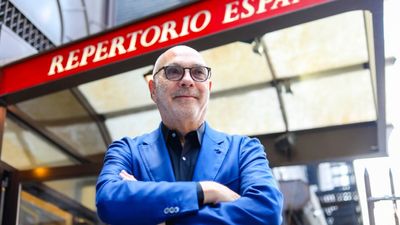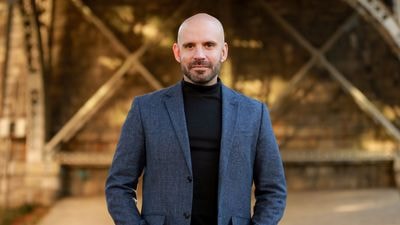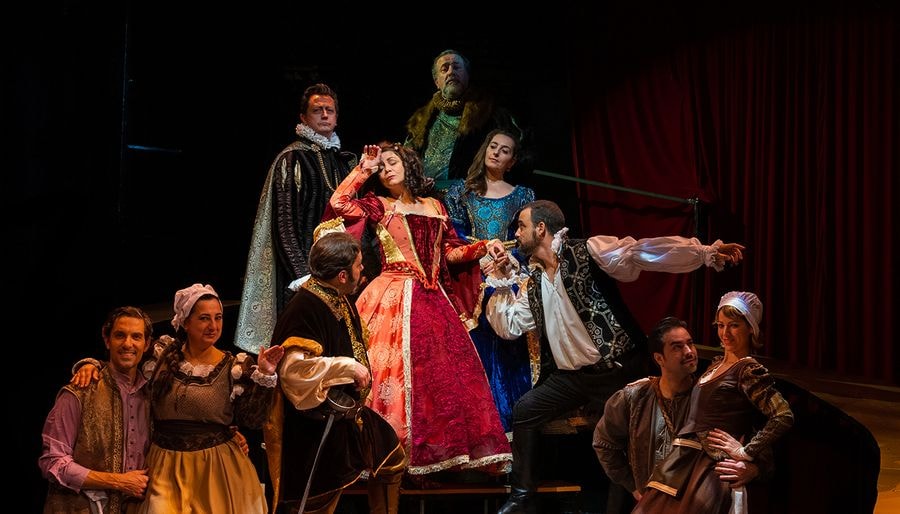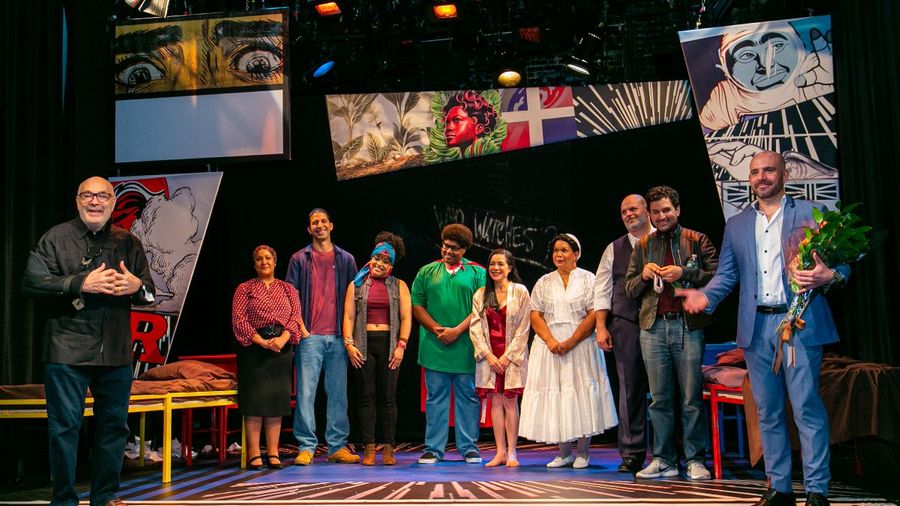When Robert Federico arrived at New York City’s Repertorio Español in 1970, he couldn’t have imagined that upon his retirement more than 50 years later he would be leaving behind a legacy that redefined Hispanic theatre in the United States and all over the world. Listening to the care and love with which he talks about his beloved company, one can’t help but think even if he didn’t imagine it, he certainly must have dreamt it.
Founded initially in 1968 by Gilberto Zaldívar and René Buch, Repertorio has been a nurturing space for Hispanic artists and audience members from Latin America, Spain, and Portugal, an oasis of sorts that has welcomed those who don’t necessarily know that theatre is for them. Emphasizing the importance of celebrating Hispanic cultures in all their diversity, from reggaeton musicals to flamenco, Repertorio has excelled equally at rescuing overlooked classics and commissioning exciting new pieces from contemporary playwrights.
From its inception, Repertorio has been known for its vibrant repertory of plays, performed in rotation by a company of actors who seamlessly transform into different characters, sometimes within the same day. Once I saw the brilliant actor Zulema Clares play four different people within the same week. This model, funded by individual donations and institutional and government grants, allows artists to experiment and grow within a safe environment.
When Federico took over as executive producer in 2005, he extended the legacy of the founders who once welcomed and nurtured him. Almost 20 years later, he announced that Rafael Sánchez would be the next in this lineage he holds so precious. As Sánchez officially starts his tenure at the theatre, which has a budget of roughly $2.7 million, we spoke to him and Federico about what Repertorio means to them and the importance of cross-generational collaboration.
Jose Solís: Don Robert, how did you decide it was time to step down?
Robert Federico: The idea of retirement came shortly after Rafa arrived at Repertorio. Before him, I couldn’t think of anyone in New York who could run the company, so retirement was not something I thought about, although I did think about my age. In 1981 Gilberto Zaldívar, René Buch, and I started a list of potential leaders to take over at some point. Throughout the years I kept an eye on promising people in New York and other cities in the United States, but I never found someone I thought could keep the company running. Then Rafa arrived and he was crazy enough to say yes to my proposal, which made retirement seem possible.
Rafa was here during our 50th anniversary celebration, and by that time I was starting to worry about repeating myself, I thought perhaps Repertorio needed someone with more energy and new ideas. I think I fared well during my tenure, but I knew I’d end up repeating myself before long. Rafa arrived with this incredible knowledge of classical and contemporary theatre, he was bilingual, and having run his own company in Puerto Rico, he knew all about the Caribbean and Latin American audiences, which is key to Repertorio. He also reminded me so much of a young Gilberto that everything just made sense. I’m turning 77 in November, and I wondered what would happen if I was gone suddenly, so it felt like the right time.
Rafa, how did you react to Don Robert’s ask?
Rafael Sánchez: I was incredibly honored, flattered, and filled with joy, really. Repertorio is such an important institution doing work that’s meaningful not just in New York but all over the world. I never imagined I’d run a company in the city, but I think my experience as an actor and producer in Spain and Puerto Rico taught me what I needed to lead Repertorio. Of course, I knew the company before working here, so learning from Robert during the three years before I took over was such a delight. Shadowing him was a pleasure, especially because we’re at a time when so many emblematic companies are making way for a new generation of leadership to take over. It’s a complicated moment, but it can also be so liberating, which is why I’m so proud and grateful that Robert decided to do this.

Don Robert, looking back, what was Repertorio like when you first got here?
Federico: I arrived through a friend of Gilbert in 1970. I was looking for work as a set designer, and when the next year their head designer left to work in Maine, I was asked to do more things around the theatre. In 1972 we moved to the building where we are now, and in addition to set and costume design, I started helping around the office with an assortment of duties. By 1973 I became full time, and by then I was also in love with the company. I grew up in love with theatre; my father was Italian and loved the arts, and even though this was a Latin American company, it reminded me so much of the Italian theatre I grew up with.
Are there any nooks in the theatre you’re especially fond of that you’re going to miss?
Federico: Not in the building. To me, a theatre is the people who work there, not the building itself. I love the actors, directors, designers, and writers. When it comes to the space itself, I’m indifferent. You know, I love being part of a company like this one; for example, when we wanted to do Filomena Marturano, we could because we had Zulema Clares; when we wanted to do Cándida Erendira, we could because we had Ofelia González. Repertorio is the people.
What about you, Rafa?
Sánchez: I can’t help but think of the gem of a building we have and how it’s a place where people can come see plays in Spanish, but I also think of our educational programs and our teaching artists. We do things not everyone is aware of to help empower Latino writers throughout the city, which makes Repertorio so much more than just a building.
I love the dichotomies I see in the theatre—a play like La Gringa, for example, which makes audience members think about how the same person can be seen as American and Puerto Rican, depending on where they are. It’s a timeless immigrant story. I love standing in the lobby after a play and listening to audience reactions, students in particular. Some of them have never been to a theatre before, and all of a sudden they can become our future audience members.
La Paz Perpetua was the last production where both of you acted as artistic directors. What was that experience like? What would you say you learned about each other during that time?
Sánchez: It’s not easy to isolate our work together to one production, because we also were working on programming the season, running our educational programs, and producing shows that students and general audience members alike would want to see. Thinking about programming, for instance, I learned from Robert how to create a season that can be interesting and entertaining for several kinds of audience members without compromising our artistic vision. We know we can adapt a famous book and have a popular play, but how would it fit with the other shows we have? Robert has been an expert curator, and I’ve learned how to figure out the puzzle of a season watching him work.

It almost sounds like Tetris.
Sánchez: It is like Tetris! Let’s say we’re about to end the run of a Spanish Golden Age classic—what do we replace it with? Instead of doing a well-known play from the era, why not look at Latin American theatre during that time period? So many people have come to us with wonderful ideas, but we need to figure out how those plays will work with what we already have in rep. Will they complement each other? Will there be a dialogue between them?
Something that helped a lot during the transition period was knowing that Robert and I understand each other very well. We literally have the same sense of humor, so we spend endless hours working and sharing jokes. We get along wonderfully.
Don Robert, before you tell me what you’ve learned from Rafa, I’m dying to hear the funniest joke he’s told you.
Federico: It’s not fit to print! [Laughs]
Fair enough! So what did you learn from him then?
Federico: Rafa is from another generation. We are very different, but we also have so much in common. I see a line that runs from Gilberto, Rene, and me all the way to Rafa. It’s Repertorio continuing to be a place where young Hispanic artists can get their break. I’ve seen so many companies that abandon their values and mission every time there is a change in leadership, but not here. Rafa will continue the work we’ve been doing for over half a century.
Rafa, you took over around the time the pandemic started. I remember Repertorio was one of the first New York companies that made shows accessible through streaming, while also creating all-new digital content. What were some of the challenges of this transfer of power during a time of such uncertainty in the industry?
Sánchez: We all had a scary season, not only professionally but personally. We were in a world that made no sense any more, we had no idea where we were headed or how long this would last. In a way, going digital rescued us. I remember the day we told the company we would have to shut down; we told people to take whatever they needed to work from home. We didn’t know when we’d be back together.
I was so impressed and I remain grateful for the way in which our team adapted to this sudden change. The fact that we were creating work for artists from their homes went against the very nature of what theatre is, so it was very challenging. The pandemic represented an opportunity for us to learn about things we didn’t know we could do. We had to figure out how to work with new formats, how to subtitle shows, how to do new contracts for our actors and talent who were making digital programming. We make theatre, not movies, so everything during this time was a bit scary.

I’m the kind of person who thinks that when you’re presented with a challenge, it’s important to find a solution. Repertorio was an example of courage and determination, and our courage during this time was rewarded in many ways. For instance, via streaming we were able to reach households and people in places all over the world we never imagined we’d reach before. I think of this as a lifesaver for us and our audience members. We continued doing what we love while providing them with an escape from a terrifying time.
Federico: Although I’m not a fan of streaming, the best digital production I saw was Leyma López’s La Dama Boba. She did so much with the limited resources she had; some of it was done using archival footage and actors in period costumes, while other parts were done at home in regular clothes. It’s by far the smartest, most imaginative thing I’ve seen in the last two years.
Sánchez: We’ve always had a limited amount of space at Repertorio, a limited amount of seats too, so we were used to doing work with spatial limitations. I worked the same way in Puerto Rico, where self-management led to us doing our own productions. Sometimes these limitations can become your biggest allies. This transition to digital was like that; I believe we found creative ways to work and we should be proud of what we accomplished.
Rafa, will digital access now be a permanent part of Repertorio’s programming?
Sánchez: Yes. Look, we want people to come to the theatre because really there is nothing like having actors and audience members sharing a space. Artists feed off what the public gives them; nothing can compare to that instant feedback. But we now know it’s also true that by streaming our productions we can reach people who can’t make it to the theatre. So yes, digital programming will be a permanent part of Repertorio.
Don Robert, you’ve been a designer, administrator, and artistic director, among other positions. Is there any job in theatre you’d like to try before retiring?
Federico: Singing, dancing, and acting. Sadly I’m not a great singer, I think it’s too late to take up dance lessons, and when I took acting classes as a teenager, I was so bad I laughed at myself. I didn’t know how to be someone other than myself. I also don’t think I’d make it through all those rehearsals. Perhaps in another life, I’ll start dancing at a young age. In this life I’ve done everything I wanted.
Jose Solís (he/him) is a frequent contributor to this magazine.





